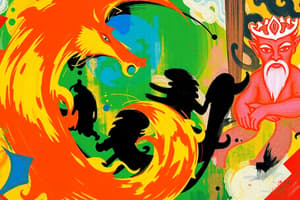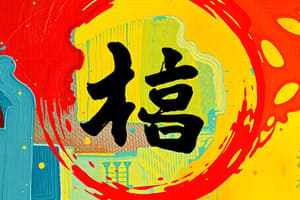Podcast
Questions and Answers
Which concept attributed to Laozi suggests aligning actions with the natural flow of events rather than forcing outcomes?
Which concept attributed to Laozi suggests aligning actions with the natural flow of events rather than forcing outcomes?
- Legalism
- Yin and Yang
- Filial Piety
- Wu Wei (correct)
How did Laozi's teachings influence governance, according to the Tao Te Ching?
How did Laozi's teachings influence governance, according to the Tao Te Ching?
- By suggesting rulers lead by example and virtue with minimal interference. (correct)
- By centralizing power and suppressing dissent to ensure stability.
- By advocating for strict laws and harsh punishments to maintain order.
- By promoting aggressive military expansion to secure resources.
What is the significance of 'Yin and Yang' in Laozi’s teachings?
What is the significance of 'Yin and Yang' in Laozi’s teachings?
- It promotes the dominance of one force over another to achieve stability.
- It highlights the balance of opposites and the acceptance of natural dualities. (correct)
- It emphasizes the importance of resisting and overcoming natural dualities.
- It represents the singular, unchanging nature of the universe.
Why is Laozi's philosophy of simplicity and humility relevant in contemporary society?
Why is Laozi's philosophy of simplicity and humility relevant in contemporary society?
How has the Tao Te Ching impacted religious practices beyond Daoism?
How has the Tao Te Ching impacted religious practices beyond Daoism?
What role is Laozi traditionally believed to have held in the Zhou dynasty?
What role is Laozi traditionally believed to have held in the Zhou dynasty?
How does the concept of 'Wu Wei' apply to leadership, according to Laozi’s teachings?
How does the concept of 'Wu Wei' apply to leadership, according to Laozi’s teachings?
Which quality does Laozi praise as being able to overcome the hardest thing in the world?
Which quality does Laozi praise as being able to overcome the hardest thing in the world?
In what way has the Tao Te Ching influenced Western philosophical thought?
In what way has the Tao Te Ching influenced Western philosophical thought?
What does the 'Dao' represent in Laozi’s philosophy?
What does the 'Dao' represent in Laozi’s philosophy?
How does Laozi suggest individuals should approach the balance of opposites, such as strengths and weaknesses?
How does Laozi suggest individuals should approach the balance of opposites, such as strengths and weaknesses?
What is the primary focus of individuals seeking inspiration from the Tao Te Ching today?
What is the primary focus of individuals seeking inspiration from the Tao Te Ching today?
Which of these movements has not been influenced by the Tao Te Ching?
Which of these movements has not been influenced by the Tao Te Ching?
How does the Tao Te Ching's advice on simplicity contrast with modern societal trends?
How does the Tao Te Ching's advice on simplicity contrast with modern societal trends?
What is a practical modern application of the principle of 'Wu Wei'?
What is a practical modern application of the principle of 'Wu Wei'?
Which of the following statements best reflects Laozi's view on the relationship between humanity and nature?
Which of the following statements best reflects Laozi's view on the relationship between humanity and nature?
Based on Laozi's teachings, what is the most effective approach to resolving conflicts?
Based on Laozi's teachings, what is the most effective approach to resolving conflicts?
What distinguishes Laozi’s philosophy from rigid ethical systems?
What distinguishes Laozi’s philosophy from rigid ethical systems?
How does the Tao Te Ching encourage individuals to view societal constructs?
How does the Tao Te Ching encourage individuals to view societal constructs?
Laozi's teachings suggest that true strength lies in:
Laozi's teachings suggest that true strength lies in:
Laozi is a renowned _____ (philosopher/poet) and the author of 'Tao Te Ching'.
Laozi is a renowned _____ (philosopher/poet) and the author of 'Tao Te Ching'.
His teachings are based on the concept of _____ (Christianity/Dao) and harmony with nature.
His teachings are based on the concept of _____ (Christianity/Dao) and harmony with nature.
'Tao Te Ching' consists of _____ (several/dozens) of chapters, each exploring the idea of _____ (wisdom/sorrow).
'Tao Te Ching' consists of _____ (several/dozens) of chapters, each exploring the idea of _____ (wisdom/sorrow).
Laozi's influence is widely felt in both _____ (Chinese/European) culture and _____ (Asian/American) philosophy.
Laozi's influence is widely felt in both _____ (Chinese/European) culture and _____ (Asian/American) philosophy.
A key figure in Daoism, the author of 'Tao Te Ching'.
A key figure in Daoism, the author of 'Tao Te Ching'.
The concept of the "Way," fundamental in Daoist philosophy.
The concept of the "Way," fundamental in Daoist philosophy.
A philosophical and religious tradition based on the teachings of Laozi.
A philosophical and religious tradition based on the teachings of Laozi.
A key concept in Daoism emphasizing the importance of human alignment with nature and society.
A key concept in Daoism emphasizing the importance of human alignment with nature and society.
Flashcards
Who is Laozi?
Who is Laozi?
Legendary founder of Daoism and author of the Tao Te Ching.
What is Dao?
What is Dao?
The fundamental principle underlying the universe, often translated as 'the Way'.
What is Daoism?
What is Daoism?
A philosophical and religious tradition emphasizing living in harmony with the Dao.
What is Wu Wei?
What is Wu Wei?
Signup and view all the flashcards
What is Yin and Yang?
What is Yin and Yang?
Signup and view all the flashcards
What is Governance by Virtue?
What is Governance by Virtue?
Signup and view all the flashcards
What is Harmony?
What is Harmony?
Signup and view all the flashcards
What is the Tao Te Ching?
What is the Tao Te Ching?
Signup and view all the flashcards
What is Simplicity?
What is Simplicity?
Signup and view all the flashcards
What is Humility?
What is Humility?
Signup and view all the flashcards
Study Notes
- Laozi is a philosopher and the founder of Daoism (Taoism).
- He is traditionally credited as the author of the Tao Te Ching.
- The Tao Te Ching has influenced Chinese thought, governance, and spirituality.
- Laozi is believed to have lived during the 6th century BCE.
- He served as an archivist in the Zhou dynasty’s royal court.
- He withdrew from society to live a life of solitude.
Philosophical Views
- Laozi's teachings are based on the concept of Dao, "the Way".
- Dao is the principle that underlies the universe, guiding natural and human affairs.
- His philosophy emphasizes spontaneity, balance, and harmony with nature.
- Promoting "Wu Wei", aligning with the natural flow of things rather than forcing actions.
- Wu Wei does not imply passivity.
- Individuals should embrace both strengths and weaknesses, activity and stillness.
- He warns against excessive desires, ambition, and rigid societal constructs.
- Advocates for qualities such as humility, stating that "the softest thing in the world overcomes the hardest."
- Suggests that the best rulers govern with minimal interference, leading by example.
Impact of the Tao Te Ching
- The Tao Te Ching has shaped Chinese culture for over two millennia.
- Influencing Daoist religious practices, Confucian thought, and Chinese Buddhism.
- Its ideas on governance have been referenced by rulers, scholars, and political theorists.
- Laozi’s influence is felt in both Chinese culture and Asian philosophy.
- The Tao Te Ching has been translated into numerous languages.
- Influenced movements such as Zen Buddhism, New Age spirituality.
- Influenced Western philosophical thought on minimalism and sustainability.
Relevance in Contemporary Society
- Laozi’s ideas remain relevant today.
- His emphasis on balance and simplicity offers guidance in managing stress and consumerism.
- The concept of wu wei can be applied to leadership, mindfulness practices, and conflict resolution.
- The Tao Te Ching continues to inspire individuals seeking inner peace and sustainable living.
Key Terms
- Laozi: A key figure in Daoism, the author of Tao Te Ching.
- Dao: The concept of the "Way," fundamental in Daoist philosophy.
- Daoism: A philosophical and religious tradition based on the teachings of Laozi.
- Harmony: Human alignment with nature and society.
Studying That Suits You
Use AI to generate personalized quizzes and flashcards to suit your learning preferences.




